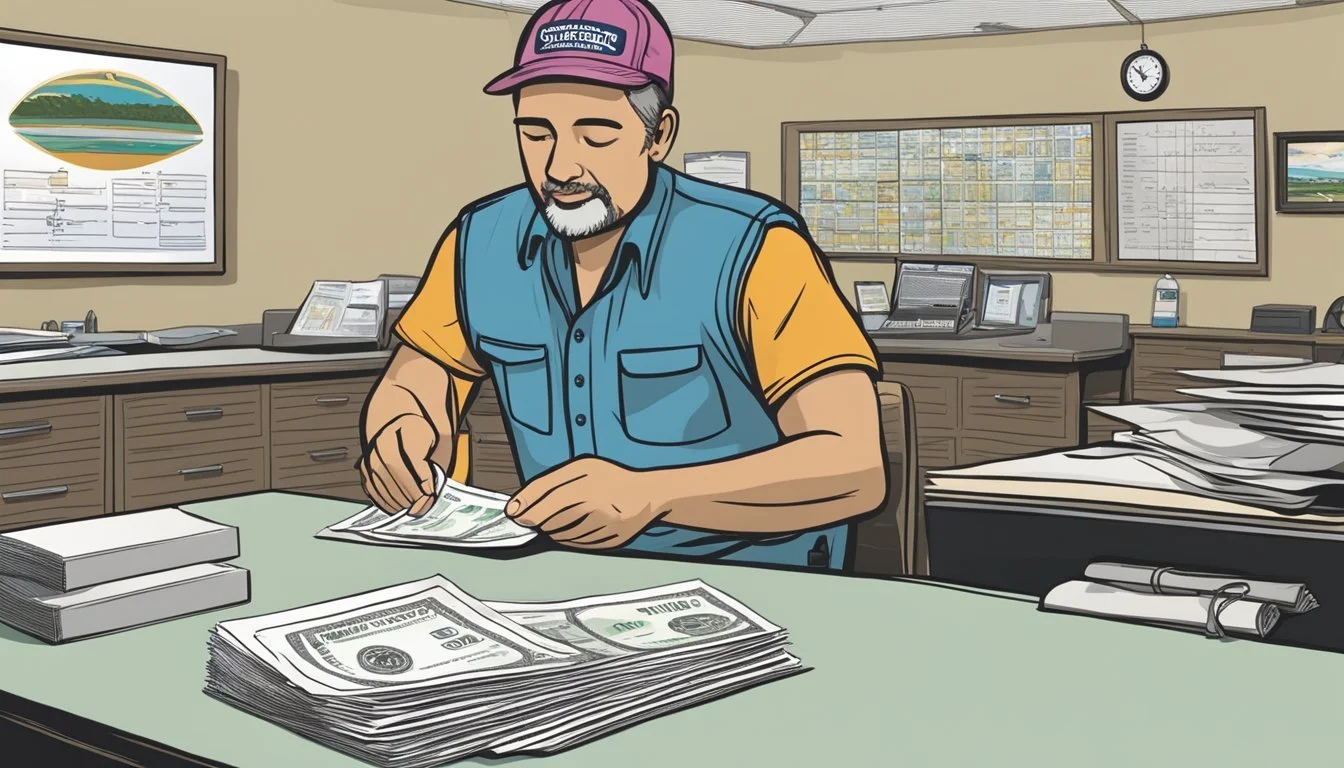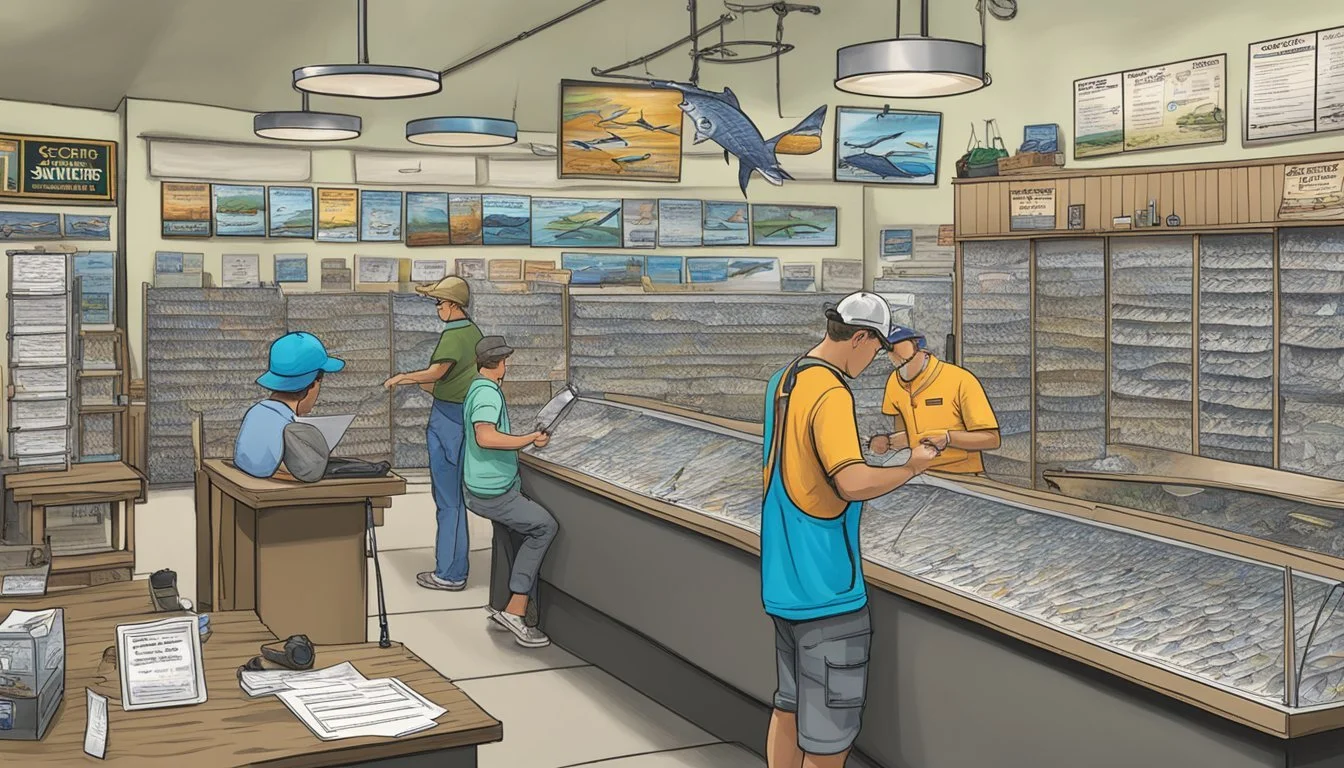How to Get a South Carolina Saltwater Fishing License
Your Essential Guide
South Carolina offers a rich tapestry of saltwater environments, inviting anglers to enjoy its coastlines and marine life. For those looking to cast their lines into these waters, obtaining a saltwater recreational fishing license is a necessary step. The South Carolina Department of Natural Resources oversees the issuance of these licenses, ensuring that fishermen abide by the state's fishing regulations to sustain fish (What wine goes well with fish?) populations for future generations.
The process for getting a South Carolina saltwater fishing license is designed to be straightforward. Both residents and nonresidents can purchase their licenses with relative ease. Local bait and tackle shops, numerous other license agents, the SCDNR website, and state office locations provide convenient points of sale for anglers to secure their licenses before heading out to fish. A clearly defined set of rules and best practices are in place, including the use of appropriate tackle and quick landing of fish, to promote ethical fishing practices.
Understanding Licensing in South Carolina
South Carolina requires individuals to obtain licenses for both saltwater and freshwater fishing. The South Carolina Department of Natural Resources (SCDNR) is the governing body responsible for managing these licenses. Licenses are essential for residents and non-residents who wish to fish in South Carolina's waters.
Resident Licensing: A resident is someone who has lived in South Carolina for at least 365 consecutive days before applying for a license. Resident anglers can purchase annual licenses at a lower rate compared to non-residents. Special licenses, such as the lifetime license, senior license, and disability license, offer added benefits and must be obtained through appropriate proof and applications.
Saltwater Fishing License: Required for those fishing from the shore or engaged in shrimping and crabbing.
Freshwater Fishing License: Necessary for angling in inland waters.
Non-Resident Licensing: Non-residents must purchase a non-resident license, which is priced higher than resident licenses. Temporary licenses such as a 14-day pass are available.
Licenses can be purchased online through the SCDNR website or at DNR offices. After an online purchase, a receipt is emailed which can be used immediately for fishing activities.
Combination Licenses: Hunting and fishing combination licenses are available for those who engage in both activities, potentially providing a cost-effective solution.
Additional Permits: Some fishing activities may require additional permits, tags, or stamps. It is advisable to check the specific requirements for the intended fishing activity.
Residents and non-residents should ensure they understand and comply with the licensing regulations set by the SCDNR to protect the state's natural resources and support conservation efforts.
Eligibility and Requirements
Before one can enjoy the abundant coastal waters of South Carolina for recreational fishing, there are specific eligibility criteria and requirements that must be met to acquire a saltwater fishing license. These include establishing residency, meeting age-related conditions, providing information for military personnel and students, and understanding special licensing provisions for individuals with disabilities.
Proof of Residency
To qualify as a resident for a South Carolina fishing license, individuals must provide proof of residency. This includes presenting a valid South Carolina driver's license or identification card with the applicant's name and address. The SC Code of Laws Section 63-14-1080 mandates that the address on the proof of residency match the one used in the application.
Age Criteria
All individuals 16 years old or older are required to have a saltwater fishing license. However, per federal law 42 USCA 666(a)(13), they must also provide their social security number as part of the Child Support Enforcement Unit's effort to ensure compliance with child support laws.
Military Personnel and Students
Active duty military personnel who are residents of South Carolina, but stationed elsewhere, and their immediate family are eligible for resident fishing licenses. Similarly, students from other states attending school in South Carolina also qualify for resident licenses, as long as they can present evidence of full-time enrollment and a student ID.
Special Licensing for Disabilities
Special provisions are in place for individuals with disabilities. Applicants may be required to submit documentation of their disability status from a certified medical professional to qualify for any special licensing accommodations. These special licenses often include additional benefits, such as reduced fees or extended expiration periods.
How to Purchase a Saltwater Fishing License
To acquire a South Carolina saltwater fishing license, an angler has several convenient options. They can register online, visit a South Carolina Department of Natural Resources (SCDNR) office in person, or go to an authorized vendor. Each method requires proof of residency for residents, and all applicants must provide a social security number.
Online Registration
Individuals can obtain a saltwater fishing license quickly and easily through the SCDNR's official website. The online system is accessible 24/7 and requires the applicant to fill out the necessary forms and submit payment securely. Residents must provide proof of having lived in the state for the previous 365 consecutive days.
Required documentation: Social security number, proof of residency for residents
Steps:
Visit the SCDNR online licensing system.
Complete the application form.
Pay the applicable fee with a credit or debit card.
In-Person at SCDNR Offices
Anglers may also visit SCDNR offices to purchase their licenses directly. The main SCDNR office is located in Charleston, SC 29422-2559. Special permits and tags, along with general fishing licenses, are available at these locations.
Key SCDNR office: Charleston
Process: Present required documentation and payment to a representative
Authorized Vendors
Finally, licenses can be bought from various authorized vendors throughout the state. These include tackle shops and outdoor retailers. Nonresidents and residents alike should be prepared to provide the necessary documentation.
Documentation: Social security number, and for residents, evidence of residency
Vendor locations: Statewide, specific addresses available at SCDNR's website
Purchasing a saltwater fishing license in South Carolina is a straightforward process. Whether online, in person at a SCDNR office, or through a local vendor, the state offers multiple avenues to ensure anglers can legally enjoy the rich fishing opportunities along its coast.
Different Types of Licenses and Permits
In South Carolina, a variety of licenses and permits are available for saltwater fishing enthusiasts, ranging from short-term passes for visitors to lifetime licenses for residents. Commercial fishers also have specific requirements, and additional permits may be necessary for certain activities.
Annual and Short-Term Licenses
South Carolina offers annual licenses that cater to both recreational saltwater fishermen and those who fish in freshwater. For nonresidents or visitors planning a short fishing trip, there are options for short-term licenses that may span a few days. Likewise, residents have the advantage of purchasing annual passes at a reduced rate.
Resident
Annual Saltwater License
Annual Freshwater License
Nonresident
14-day Saltwater License
Annual Saltwater License
Combination Licenses
A combination license can be a cost-effective option for avid outdoorsmen, covering both hunting and fishing activities. South Carolina provides residents with such licenses that combine the privileges of hunting and saltwater or freshwater fishing into a single annual fee.
Resident Combination Licenses
Hunting and Freshwater Fishing
Hunting and Saltwater Fishing
Commercial Licenses
For those engaging in fishing for commercial purposes, there are commercial licenses that must be obtained. To qualify for a resident commercial freshwater license, an individual needs to have been a resident for at least the past 365 days and provide proof of residency.
Commercial Fishing
Resident Commercial Freshwater Fishing License
Non-Game Fishing Devices Permit
Special Permits
South Carolina also requires special permits for the use of various fishing devices and for specific fish species. These permits include tags for eel pots, gill nets, hoop nets, traps, and trotlines. Additional permits may be required for activities like harvesting oysters (What wine goes well with oysters?), clams (What wine goes well with clams?), or crabs (What wine goes well with crab?), beyond the use of up to three handlines, fold-up traps, or drop nets.
Annual Permits for Non-Game Fishing Devices
Jug Permit
Set Hook Permit
Eel Pot Tag
Gill Net Tag
Hoop Net Tag
Trap Tag
Trotline Tag
Special tags and permits, such as the Deer Tag Application or Alligator Hunting Fee, are necessary for those seeking to hunt specific wildlife. Similarly, a Trapping and Commercial Fur Harvest License is required for individuals interested in fur trapping.
Cost of Licensing
In South Carolina, the pricing of saltwater fishing licenses varies based on the type of permit, the duration, and whether the applicant is a resident, non-resident, or qualifies for special categories like military or commercial. For residents, fees are typically lower compared to non-residents, reflecting the state's interests in promoting local recreational fishing.
Residents can expect to pay a certain fee for an annual license, whereas non-residents are often charged a higher rate for similar privileges. Specific prices are subject to change, and it is advisable to consult the South Carolina Department of Natural Resources (SCDNR) for the most current fee structure.
Duration of the license also affects the cost. Short-term licenses for transient fishing trips are available, and while these are more affordable, they are only valid for the specified duration. In contrast, there are options for annual or even lifetime licenses, which represent a higher initial expense but may be more cost-effective in the long run for avid anglers.
Licenses may be purchased online, through official SCDNR offices, or at various other authorized outlets across the state.
Special permits, tags, and fees might be necessary for certain fishing activities or for targeting specific species. Additionally, commercial licenses come with different pricing, focusing on those who fish for profit, versus recreational anglers. Children under the age of 16 and seniors often benefit from exemptions or reduced fees.
For exact pricing and details regarding each license type and associated fees, anglers should directly refer to the latest information provided by the SCDNR. This ensures compliance with up-to-date regulations and the proper license purchase for anyone's fishing needs in South Carolina.
License Duration and Renewal
When purchasing a saltwater fishing license in South Carolina, individuals should be aware of the duration of validity as well as the procedures for renewal. The licenses are available in different durations to accommodate the varying needs of anglers.
Annual License: Typically valid for one year from the date of purchase.
14-Day License: For short-term anglers, there's an option for a license valid for 14 consecutive days.
Lifetime License: This option is available for those who wish to make a one-time purchase granting them fishing rights for their lifetime.
It's essential for license holders to note the expiration date to ensure they remain compliant with state regulations. Licenses can expire on various dates, depending on the type of license acquired:
License Type Expiration Annual 1 year from the date of issue 14-Day 14 days from the date of issue Lifetime Does not expire
Renewal of licenses can typically be done through the same channels as the initial purchase: online, by phone, or in person at local Department of Natural Resources (DNR) offices. Renewal procedures should be undertaken prior to expiration to allow continued legal fishing.
Remember: Renewing a license on time maintains your eligibility for saltwater fishing and helps support marine conservation efforts.
Regulations and Legal Considerations
South Carolina imposes specific regulations and legal considerations for anyone participating in saltwater fishing to ensure sustainable practices and conservation of marine resources. It is mandatory for both residents and nonresidents to understand these guidelines and comply accordingly.
Saltwater Fishing Regulations
The South Carolina Department of Natural Resources (SCDNR) stipulates that all individuals fishing in saltwater areas must possess a valid saltwater recreational fishing license. This requirement also applies to noncommercial shrimping and crabbing. Licenses can be purchased online or through authorized vendors and must be kept in possession while fishing. The SCDNR sets size and catch limits for different fish species to maintain healthy populations. They also manage nongame areas and limits, where fishing might be restricted or prohibited to protect sensitive ecosystems.
Residents: Must have a license when fishing from the shore, a dock, or a boat.
Nonresidents: Subject to the same licensing requirements as residents.
Protected Areas and Species
South Carolina identifies certain areas as wildlife management areas (WMAs) or other types of protected areas, where additional restrictions may be in place to conserve local flora and fauna. The SCDNR and federal regulations work together to identify and protect certain marine species that are either endangered or have regulated seasons and size limits. Fishers need to be vigilant about the areas they choose and the species they target to avoid penalties for noncompliance.
WMAs: Fishing might be regulated differently; always check for specific WMA regulations.
Protected Species: Some species may have strict catch limits or be entirely protected from fishing to ensure their survival.
Compliance with Federal Regulations
In addition to state regulations, anglers must also adhere to federal regulations when fishing in federal waters. These regulations are enforced by the Office of Law Enforcement within the National Oceanic and Atmospheric Administration (NOAA). Anglers targeting highly migratory species like tunas, sharks, swordfish, and billfish must obtain an Atlantic Highly Migratory Species (HMS) Angling Permit. Compliance with both state and federal regulations is critically important and law enforcement agencies actively patrol and enforce these rules.
Federal Waters: Regulations are often more stringent and specific permits may be required.
Law Enforcement: The SCDNR and federal agents ensure compliance; penalties can include fines and suspension of fishing privileges.
Additional Licensing Considerations
When obtaining a South Carolina saltwater fishing license, anglers should be aware of specific permits required for certain species and activities. These include migratory species, big game, and shrimp baiting, each with its own set of regulations to protect wildlife and marine resources.
License for Migratory Species
For anglers targeting migratory waterfowl, a migratory bird permit is mandatory. This permit is in addition to the state fishing license and often requires a federal duck (What wine goes well with duck?) stamp purchase. The federal duck stamp is crucial for waterfowl conservation and must be signed across the face to be valid.
Big Game Licenses
In the realm of big game, which includes species like bear, additional tags such as a bear tag are necessary. Likewise, when hunting for turkey, hunters must have turkey tags in their possession. Each tag is species-specific and aids in tracking population and conservation efforts.
Shrimp Baiting Licenses
Those looking to engage in shrimp baiting during the designated season must obtain a separate shrimp baiting license. This activity requires understanding specific regulations, such as the use of marked poles and limits on the amounts of bait and shrimp catch per day. Licenses for nongame fish, including certain shrimp species, may also be required, ensuring the protection and sustainable harvest of these populations.
Frequently Asked Questions
How does one estimate fish weight?
Saltwater anglers can estimate fish weight using species-specific formulae which typically involve measurements of length and girth.
What changes exist for saltwater recreational fishing license requirements?
Recent changes to the requirements can be found on the South Carolina Department of Natural Resources (SCDNR) website or by contacting them directly.
When is a saltwater recreational fishing license necessary?
A license is required for individuals engaging in recreational fishing in South Carolina's saltwaters.
Does every recreational saltwater fishing activity require a license?
Most activities do; however, exceptions are detailed in the SCDNR's regulations.
Is a senior license sufficient for shore fishing in saltwaters?
The senior license may have particular stipulations that cover shore fishing, but individuals should verify with the SCDNR for specifics.
What distinguishes mussels, clams, and oysters regarding regulations?
Mussels: Considered oysters under applicable regulations.
Clams: Subject to separate regulations.
Oysters: Have specific regulations, distinct from clams.
Is there a specific crabbing season?
Crabbing can be done year-round in South Carolina, yet size limits and license requirements still apply.
How does one keep red drum caught in federal waters?
Anglers need to follow both state and federal regulations when keeping red drum caught beyond 3 nautical miles from shore.
For additional queries, the SCDNR provides resources and contact information for licensing and permits on their website.
Additional Resources and Contact Information
Obtaining a South Carolina saltwater fishing license is key for anglers looking to explore the state's rich marine resources. For further assistance and resources, individuals should reach out to the South Carolina Department of Natural Resources (SCDNR) and navigate through related links for comprehensive understanding.
SCDNR Contact Details
Address:
SCDNR Marine Resources Division
P.O. Box 12559
Charleston, SC 29422-2559
For specific inquiries or assistance regarding the Saltwater Recreational Fishing License Program:
Phone: Insert a direct number for license inquiries
Email: Provide SCDNR email address for fishing licenses
Office Hours: State the business hours during which the SCDNR offices are open
Photos or documents might be required for certain applications or corrections, so it's beneficial to keep digital copies accessible for such needs.
Related Links and Information
Saltwater Rules and Regulations: Access up-to-date legal information to ensure compliance while fishing.
Lifetime License Application: Find the PDF form for those interested in applying for a lifetime saltwater fishing license.
Best Fishing Practices: Explore materials on responsible fishing, including minimizing harm to the local marine life.
Recreational Catch information: Utilize resources provided to report and learn about recreational catch for sustainable fishing efforts.







